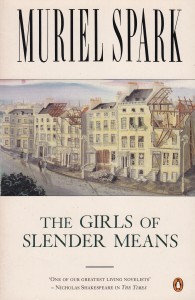In 1945 all the nice people in England were poor
 The Girls of Slender Means
The Girls of Slender Means
by Muriel Spark
This odd little book is funny and tragic, fleeting and profound. I enjoyed it quite a bit more than Muriel Spark’s more famous work The Prime of Miss Jean Brodie.
It’s the story of a Kensington hostel, “The May of Teck Club for the Pecuniary Convenience and Social Protection of Ladies of Slender Means below the age of Thirty Years, who are obliged to reside apart from their Families in order to follow an Occupation in London.” With savage brilliance, Spark lampoons everyone – the young women new to the club, intent only on dating airmen and giggling endlessly; the slightly older women who are engaged or very nearly engaged or seriously intent on their careers; the sad old spinsters who try in vain to control goings-on at the club; the married men who become obsessed with the May of Teck and all it represents.
There are two timelines: 1945 and an unspecified “many” years later (the novel was published in 1963 and this seems a reasonable guess as to the “future” year). In the future timeline, journalist Jane Wright is phoning round her old friends from the May of Teck to break the news to them of the death of a man they all used to know, who used to visit the May of Teck in 1945. The 1945 storyline runs roughly from VE Day to VJ Day, and is occupied with that uncertain jubilation, the balance between sudden peace and stricter-than-ever rationing, a city half in ruins but no longer under threat.
“Long ago in 1945 all the nice people in England were poor, allowing for exceptions. The streets of the cities were lined with buildings in bad repair or in no repair at all, bomb-sites piled with stony rubble, houses like giant teeth in which decay had been drilled out, leaving only the cavity. Some bomb-ripped buildings looked like the ruins of ancient castles until, at a closer view, the wallpapers of various quite normal rooms would be visible, room above room, exposed, as on a stage, with one wall missing.”
Back then, Jane Wright worked for a tiny publisher, the kind of small independent that takes on manuscripts rejected by the “big boys”. Jane is a figure of fun, but also respect, as she demands peace and quiet on the top floor of the May of Teck to concentrate on her “brain work” – a dig at the occupations of the other young ladies but also a self-reassurance that she is after all terribly clever and mixing with intellectuals just as she had hoped to.
Joanna Childe is a rector’s daughter who gives elocution lessons, and the novel is peppered with extracts from poems that she is reciting to her pupils. The other club residents are proud of Joanna and wax lyrical about her incomparable voice.
Selina Redwood is a great beauty, one of a very small number of club residents slim enough to climb through the bathroom window onto the flat roof shared with the hotel next door to sunbathe – and to sleep with a man who works for the American military intelligence unit based in the hotel. Twice a day she recites the Two Sentences, designed to give her poise and elegance.
The theme of repetition is also picked up in the way Spark tells the story. Often she will return to an earlier scene by repeating word for word a couple of paragraphs, before illuminating a new detail or continuing where before she left off. In this way she demonstrates the repetitive nature of life but also the capacity to see new details by looking at a scene from a new perspective.
“Beyond the grimy window rain fell from a darkening sky on the bomb-sites of Red Lion Square. Jane had looked out in an abstract pose before making her revelation to Nicholas. She now actually noticed the scene, it made her eyes feel miserable and her whole life appeared steeped in equivalent misery. She was disappointed in life, once more.”
The story is wryly observed, genuinely funny and often harsh to the characters, but still warm and affectionate of them all. It gets gradually darker as it builds to a climax, and the celebrations of VJ Day are noticeably more frightening in their decadence than those of VE Day – or have the characters just learned enough about life in the intervening months to notice the negative aspects of discarding social niceties?
I’m certainly won back over to Muriel Spark by this book. What others of her works should I read?
Published 1963 by Macmillan.
Source: I think this might be one of the books I got from Tim’s Mum when she had a clearout? I really need to keep better records of my secondhand books!
Challenges: This counts towards the Classics Club.
I’ve just read TPOMJB for my classics challenge and am interested to read more, thanks for this great review, I’ll give it a read!